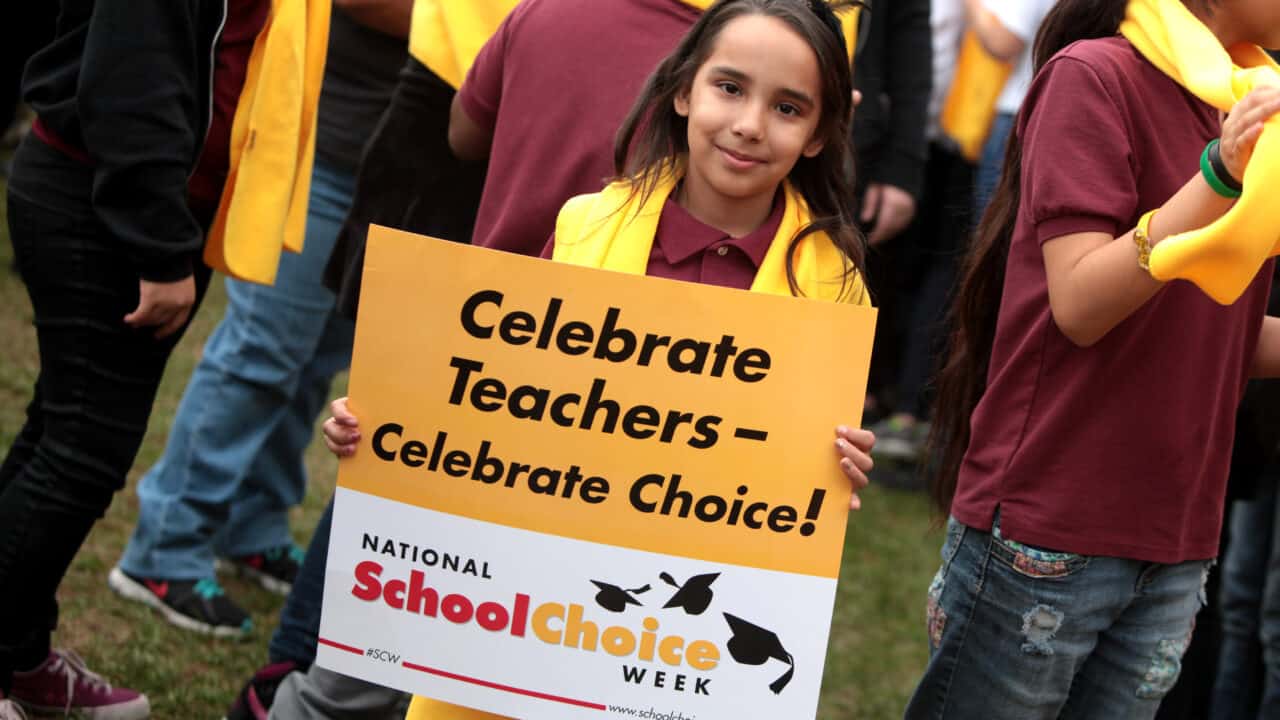 School Choice Week Students by Gage Skidmore from Surprise, AZ, United States of America is licensed under CC BY-SA 2.0 via Wikimedia Commons.
School Choice Week Students by Gage Skidmore from Surprise, AZ, United States of America is licensed under CC BY-SA 2.0 via Wikimedia Commons.
This week, the Illinois state legislative session closed without renewing the Rauner-era school choice scholarship program set to expire on December 31st of this year. The program, dubbed the Invest in Kids Act, gives a 75% tax credit to anyone who donates to a private school scholarship fund for low-income students. The program sends 9,600 underprivileged Illinois kids to private schools every year without decreasing funding for public schools by one cent.
Although Democratic Governor J.B Pritzker has said that he supports a renewal of the program, the Speaker of the Illinois House Emmanual Welch used his unusually strong legislative authority to block a vote on the bill. The program, which voters support 3-to-1, still has hope in the spring legislative session, although students will see a break in their scholarships even if it is renewed.
Speaker Welch is guilty of more than partisanship; he is actively damaging Illinois students. Only 34% of Illinois students can read at grade level, and scores have been declining steadily since 2018. The Invest in Kids Act takes kids out of failing public schools and gives them the opportunity to study at better-run private institutions.
Welch and his supporters claim that there is no evidence the school choice program has worked. What they didn’t mention, however, is exactly why they lack evidence. In a statement to the Associated Press, Senate Minority Leader John Curran (R-Downers Grove), explained the ‘lack of data’ that Democrats point to as proof of inadequacy:
“Unfortunately for the thousands of Invest in Kids families, it appears that Gov. (J.B.) Pritzker’s administration either failed to complete, or failed to share these assessments four years in a row, which has emboldened opponents to point to the lack of data the administration refused to collect.”
Regardless of whether Illinois lawmakers have specific numbers on their program, there is an abundance of accumulated evidence that school choice works, both for charter schools and more controversial private school vouchers. A systematic meta-analysis of private school voucher programs found consistently higher test scores for students randomly assigned vouchers than for those who lost their respective lotteries. In the Democrat-engineered absence of Illinois-specific data, legislators should not throw up their hands and block school choice; they should follow the science that overwhelmingly supports maintaining school vouchers.
Other states have learned this lesson. Soaring support for school choice has translated into a rising tide of voucher programs and charter school legislation. In 2023, 16 states enacted legislation either establishing school choice or strengthening existing programs. Meanwhile, the number of states with universal school choice shot up from two to nine, and Texas is poised to become the 10th by the end of the year. In a country enjoying a school choice revolution, Illinois’s backstep is downright regressive.
The cause of Illinois’s continued failure in school choice is easy to identify. The Illinois Policy Institute, which works extensively on Illinois school choice policy, reports that teachers unions have showered legislators with $1.5 million in donations since June 1st. Although they have begun to take fire for using union funds for political purposes, it seems union leaders see the power they gain from crushing private schools as well worth the public relations costs.
Stacy Davis Gates, the head of the powerful Chicago Teachers Union, is one of the nation’s most influential anti-school choice critics. Privately, however, it seems she has a different attitude. Even as she leads the fight against allowing 9,600 low-income students to secure better educations, she sends her own son to an expensive private school, which she can afford on her $289,000 salary. The families of students on scholarships, who earn on average $45,046 per year, apparently don’t deserve the same choice.
The Illinois education system faces a haunting pedigree of failure, especially for low-income students. Renewing Invest in Kids is an extremely popular first step that both parties of Illinois legislators can take to address the problem. It’s time for the state’s leaders to shake the teachers unions’ vice grip on the legislative process and help the students they swore to serve.

